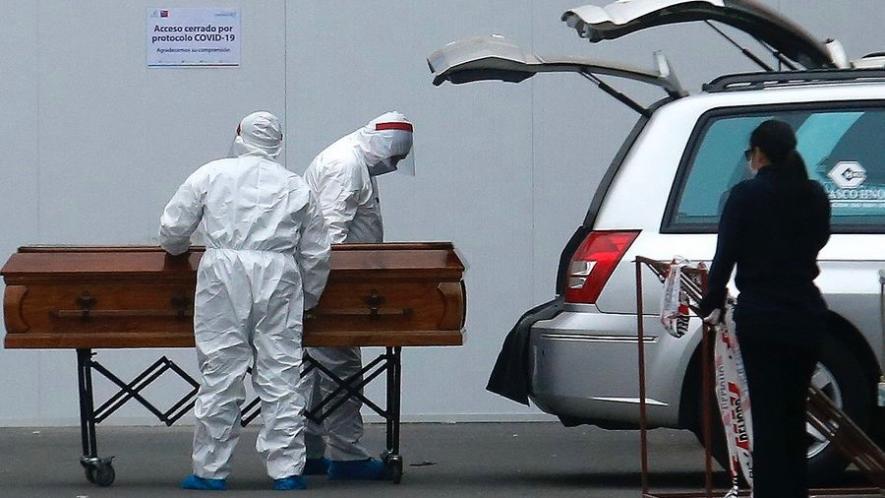Healthcare System on the Verge of Collapse in Chile

Funeral workers take body away from Hospital San Jose in Santiago, Chile. Chile is the third worst-hit country in the region and the twelfth most affected in the world with the COVID-19 pandemic. Photo: La Tercera
After Brazil and Peru, Chile is the third worst-hit country in the region and the twelfth most affected in the world with the COVID-19 pandemic. The number of coronavirus cases is growing rapidly across the country. The increasing demand for medical attention, intensive care units (ICU) and ventilators, has strained the country’s healthcare system.
With a population of 18.5 million, Chile is reporting more than 4,000 new cases everyday. Nearly 15% of the cases require hospitalisation. About 95% of the ICU beds in the hospitals across the country have already been occupied. Doctors have been forced to make wrenching choices over which patients should get the available beds, a dilemma previously faced by doctors in Italy and Spain in the month of March.
The capital, Santiago, has become the epicenter of the outbreak. More than 80% of the total number of coronavirus cases in the country and the highest number of deaths, have been registered there. The public and private hospitals in the Santiago Metropolitan Region are at their maximum capacity amid a flood of coronavirus patients. There are no beds or ventilators available for critical patients. Despite the strict quarantine measures in place for a month, the figures have not decreased. Santiago Metropolitan Region is the most populated region with about 8 million inhabitants.
On June 11, three days before his resignation, former health minister, Jaime Mañalich, warned that the worst is yet to come and that June will bring a rise in both the number of contagions and deaths in Chile. “The month of June will probably be the hardest in the fight against this disease,” said Mañalich.
As of June 15, there are about 179,436 confirmed cases of the novel coronavirus with 3,362 deaths in Chile. However, the government’s statistics have been repeatedly questioned.
Lack of transparency
Last week, on June 9, Minister of Science, Technology, Knowledge, and Innovation, Andrés Couve, announced a change in the methodology to record the number of deaths by COVID-19 in the country. According to the new system, the authorities only included the deaths that were verified with a positive test for coronavirus to the official COVID-19 death toll.
The step prompted criticism from the national medical and scientific community, which questioned the counting method, alleging it diverges from the World Health Organisation (WHO) recommendations.
Dr. Cristóbal Cuadrado, from the Medical and Academic College of the University of Chile, denounced that the authorities undercounted deceased people because those who died without having the test done or without having been admitted to a hospital, were not included in the COVID-19 death toll.
The WHO established that people who died with symptoms of COVID-19 must be counted as victims of the virus, even if they were not tested.
Many highlighted that the new methodology generates confusion and does not allow comparisons with previous reports of deaths.
In this regard, on June 10, the WHO representative to Chile, Fernando Leanes, requested the Chilean government to clarify the methodology and resolve the confusion, so that the professionals could concentrate their efforts in the right direction.
Health Minister’s resignation
Amid the confusion about the methodology, on June 12, a report by the Center for Investigative Journalism (CIPER) revealed that the health ministry provided different data to the country and to the WHO.
CIPER obtained a copy of the documentation sent by the health ministry to the WHO, according to which more than 5,000 people had died when probable coronavirus deaths were incorporated into the total, as per the WHO guidelines. While the ministry had reported 3,101 deaths to the citizens.
Amid controversy over the official death toll from COVID-19 in the country, on June 13, health minister Mañalich resigned. Chilean President, Sebastián Piñera, announced his departure and appointed Dr. Oscar Enrique Paris as the new health minister.
Regarding the death toll, the deputy health minister, Paula Daza, said the higher figure is accurate and stems from a new and different method.
National criticism
The national government’s management of the crisis caused by the pandemic has received considerable criticism from the citizens, medical professionals and the opposition, during the last few weeks.
During the month of May, health workers mobilised protesting the government’s response to the pandemic and demanded better management. While the citizens, who led an impressive nationwide movement for almost 5 months against the government’s neoliberal policies and glaring inequalities in the country, revived their struggle and took to the streets over lack of food and insufficient government aid in a number of cities.
President Piñera also conceded his government’s failure in managing the pandemic last month. At the inauguration of a new hospital in the capital, on May 24, when the country had nearly 70,000 cases, Piñera said “the healthcare system is close to collapse. It’s very in demand and very stressed out.”
Recently, a health worker and the president of the Creating Health Foundation, Matías Goyenechea, told El Mostrador that the situation in Santiago “is already out of control” and the alarming numbers “are the product of bad decisions to approach COVID-19, of a wrong strategy that basically focused on the maintaining the economy open, above the sanitary needs and the health of the population.”
He added that “the emphasis of health policy has been on the hospital, on the curative, on the ventilators, on the beds from the beginning and not on the identification of cases, traceability, monitoring and isolation. The emphasis on these issues was not timely and now we are facing a resounding failure.”
Left-wing leaders pointed out that the crisis is the inevitable outcome of decades of pro-corporate policies that have led to chronic under-funding of the healthcare system. They also highlighted that the neoliberal policies have produced extreme poverty, overcrowding and a lack of infrastructure in working class neighborhoods, conditions that are facilitating the rapid spread of the virus in the Santiago Metropolitan Region.
Proposed solutions from the people
Chilean scientific and medical organisations requested the president to change the strategy to deal with the pandemic. At the end of the last month, dozens of researchers and doctors signed a petition asking the national government to implement new strategies to curb the spread. The document specified that “a massive and systematic testing, detecting, searching for cases, reporting, tracing, isolating infected people and following up on all of them” must be immediately put to practice.
Social movements are calling on the government to ask Cuba for medical assistance. Last week, several Solidarity with Cuba organisations promoted a campaign called “A brigade for Chile, a Nobel Peace Prize,” focused on collecting signatures to bring Cuban Henry Reeve Brigade of doctors and nurses to the country and supporting the bid to award the brigade the Nobel Peace Prize. The signatures will be reflected in a letter that organisers will address to President Piñera this week.
Get the latest reports & analysis with people's perspective on Protests, movements & deep analytical videos, discussions of the current affairs in your Telegram app. Subscribe to NewsClick's Telegram channel & get Real-Time updates on stories, as they get published on our website.
























